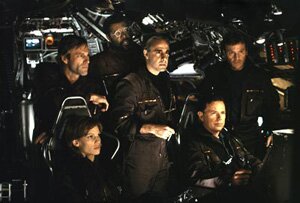 It’s summer. Surely that calls for a “popcorn” movie? I suggest The Core (2003), a “world facing imminent destruction that only a well chosen quirky few can save it from,” kind of movie.
It’s summer. Surely that calls for a “popcorn” movie? I suggest The Core (2003), a “world facing imminent destruction that only a well chosen quirky few can save it from,” kind of movie.
You don’t look to disaster movies for credibility. A disaster movie that takes itself too seriously … now that is a genuine disaster. They’re suppose to be fun and you are suppose to watch them with your brain turned off. When they are well made, they are fun. And there’s a great sense of relief in turning off the mental works every now and again.
The Core doesn’t have the best special effects but neither does it have the worst. It does, however, have some very good actors and while movies like this aren’t famous for great dialogue or character delineation, the actors here manage to bring something more to an otherwise two-dimensional script.
In other words, I like this movie. Sue me. 
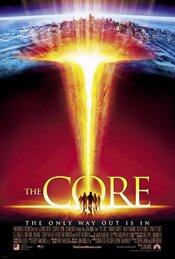 The Core
The Core
directed by Jon Amiel
Simply put, The Core is a guilty pleasure. I watch a disaster movie like this and think, “This is junk. I shouldn’t like it.”
But I do. Sometimes junk is exactly what you want. And when you’re in that mood, nothing fills the bill better than well-made junk.
And that is what The Core is: well-made junk.
The movie starts with the world going wonky. People with pacemakers suddenly drop dead and for no apparent reason. In Trafalgar Square, birds go mad, swirl wildly, fly into people and buildings, and die.
Called in my the U.S. government, a brilliant university professor (Aaron Eckhart) goes, “Hmmm.” He divines that the earth’s electromagnetic (EM) field is going all to hell. After some pondering, it’s discovered the Earth’s core has stopped spinning (made of two layers — inner solid, outer liquid — the movement of the inner is what creates the EM field, we’re told).
What to do? As it turns out, the answer is to travel to the core and jump start the laval ring with nuclear bombs. (Seems obvious, right?)
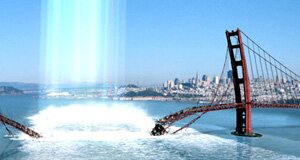 The plausibility of any of this is irrelevant. Movies of this kind are not about reality. They are essentially fantasies, science fantasies, and we’re expected not to question too much. It’s part of the bargain you make when you sit down with this kind of a film.
The plausibility of any of this is irrelevant. Movies of this kind are not about reality. They are essentially fantasies, science fantasies, and we’re expected not to question too much. It’s part of the bargain you make when you sit down with this kind of a film.
And that’s okay. You don’t watch these movies for the credibility of the extrapolations. You watch them for the thrill, the special effects, the suspense.
The Core delivers on all of these, though the special effects are … well, not top of the line. I think the movie works because it is well-paced. It seldom lets up; once you’re strapped in to your chair, agreed to the suspension of disbelief, you’re there for the duration. The g-force of the pace keeps you in your seat.
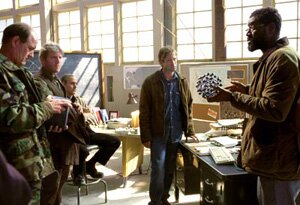 But The Core also works because it gets such good performances from a well-chosen cast.
But The Core also works because it gets such good performances from a well-chosen cast.
In this kind of movie, the characters are all caricatures. There is not a great deal of depth to any of them. But with a good cast they flesh out and transcend their two-dimensional quality and become compelling.
As the DVD features reveal (a “Making of” featurette) the director, Jon Amiel, was focused on the characters. He wanted to make a popcorn disaster movie but with more character emphasis than normally associated with these kinds of movies.
It’s not surprising from Amiel, given his background. As this part of his IMDb bio says, “After studies in English literature, Jon Amiel graduated from Cambridge University and ran the Oxford and Cambridge Shakespeare Company, which often toured the USA. He became the Hampstead Theatre Company’s literary manager and began directing there, relocating to the Royal Shakespeare Company.”
Yes, I can see why there is a focus on performance. For example, Bruce Greenwood gets what might be a thankless role as Commander Richard Iverson, the stereotype of the all-American good guy, a tremendously dull role. But Greenwood is so good in it, so compelling and credible, the character becomes interesting and you sort of wish he had been the one playing the President in Independence Day. (On the other hand, he’s such a good actor we probably shouldn’t wish such bad lines on him.)
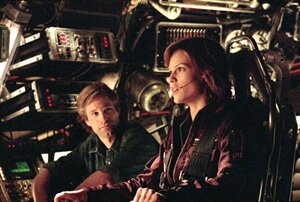 Hilary Swank also plays her part perfectly and again in what might have been a pretty colourless role. Once more, the all-American hero is what is called for, the good guy (or gal). Yet she manages to enunciate certain nuances to give the character a depth it might not otherwise have.
Hilary Swank also plays her part perfectly and again in what might have been a pretty colourless role. Once more, the all-American hero is what is called for, the good guy (or gal). Yet she manages to enunciate certain nuances to give the character a depth it might not otherwise have.
Of course, this isn’t to say the movie is a character study – far from it. But in this kind of a film, great performances add a dimension to the film that it otherwise would not have had and make it much more engaging.
The movie also boasts two of my favourite actors, both of whom give wonderful performances as eccentrics of a kind: Delroy Lindo as a desert-living, oddball scientist and Stanley Tucci as the other great American scientist, celebrated and feted wherever he goes, and who has the misfortune of being an enormous, self-centred ass. Both Lindo and Tucci add tremendously to the film.
Like any guilty pleasure, The Core is the kind of movie you feel a little embarrassed liking. But it’s unashamed junk and revels in its quality as such. Like movies such as Anaconda and Independence Day, it is simply a fun ride.
Who cares if it makes sense?
The Core (trailer)


